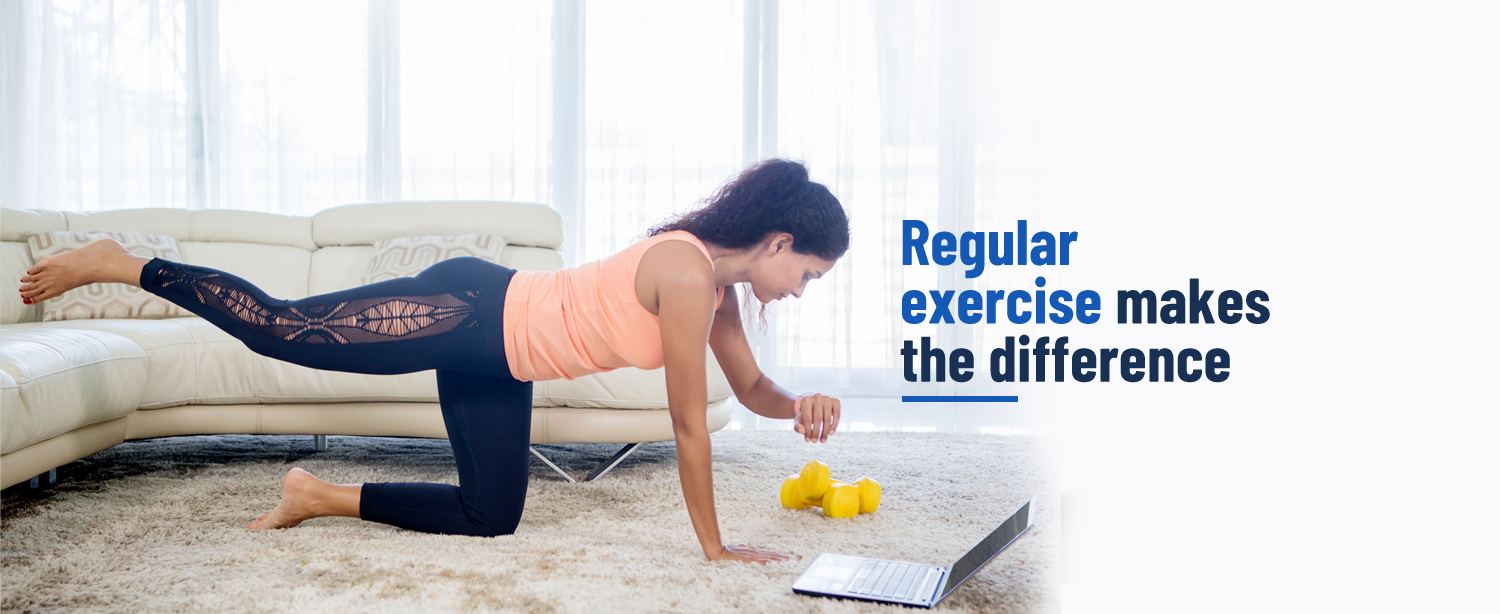Stressed, frustrated, or anxious about your career, relationships, or life in general? Highs and lows are a part of everyone’s life but an active lifestyle helps you float through and come out as a stronger and happier person. Did you know? Even a simple run has miraculous effects on your brain. Exercise can have a tremendous impact on your mood and acts as a positive coping mechanism in difficult times. In fact, in treating mild to moderate depression, it is thought that exercise can be just as beneficial as anti-depressants. Regular exercise not only has several physical health benefits but is also known to boost your mood, improve your sleep, and help you manage depression, anxiety and stress better.
Exercise and mental health
A new exercise habit enhances the brain’s reward system and increases neural connections among areas of the brain that helps calm anxiety. The natural state of the nervous system can be changed by daily physical activity so that it becomes more relaxed and less inclined to fight, flight, or fear. Around the world, people who exercise daily experience more gratitude, love, and hope in their life. These benefits are seen throughout the lifespan, including among those living with serious mental and physical health challenges. Choose a sport or exercise that you enjoy doing and see how it boosts your self-esteem and has a profound effect on your personality. Here are some of the underlying medical reasons why exercise positively impacts your mental health:
- Exercise helps chronic depression by increasing serotonin (which helps your brain regulate mood, sleep, and appetite)
- It reduces the levels of the body’s stress hormones, such as adrenaline and cortisol
- Exercise reduces immune system chemicals that can make depression worse
- Exercise increases your level of endorphins, which are natural mood lifters
- Exercise helps regulate your sleep patterns
- Exercise limits the effect of stress on your brain
The importance of exercise
People who exercise regularly tend to do so because it gives them an enormous sense of well-being. Throughout the day, they feel more energetic, sleep at night better, have sharper memories, and feel more comfortable throughout the day. And for this, you don’t have to be a fitness fanatic or spend long hours at a gym. Research indicates that even modest amounts of exercise can make a great difference to your health. Avoid exercising only for weight-loss reasons, since it takes a few weeks or months to produce results. Look at the various ways that exercise benefits your well-being from the inside out. Focus on a health-related target to remain accountable for your fitness routine, such as lowering blood pressure, decreasing stress, or sleeping better. Here is how maintaining a regular fitness regime benefits your health:
- Uplifts your mood and reduces the risk of depression
- Helps maintain a healthy weight
- Protects your heart health
- Helps relieve chronic pain
- Help reduce stress levels
- Promotes better sleep
- Boosts your fertility levels
- Improves your posture and makes you flexible
- Increases your life span
- Relieves PMS symptoms
- Slows cognitive decline
- Strengthens your bones and joints
- Supports your eye health
Stay motivated to exercise regularly
For most adults at least 150 minutes a week of moderate aerobic activity or 75 minutes a week of vigorous aerobic activity or a combination of moderate and vigorous activity is recommended. Healthcare experts suggest that you can spread this exercise throughout the week. Choose your preferred fitness activity – walking, running, swimming, dancing, biking, playing sports, lifting weights, or practicing yoga and be regular with it. Here are some additional tips:
- Make everyday activities more active – Even small changes can help. Take the stairs instead of the elevator, walk down to a nearby store instead of driving, park further away from your destination.
- Be active with friends and family – Encourage plans with your family and friends that include exercise. It can be a trek or attending a virtual fitness class together too. Set aside sometime every week to play a sport with your children and spend quality family time together.
- Keep track of your progress – Keeping a log of your activity or using a fitness tracker may help you set goals and stay motivated.
- Make exercise more fun – Try listening to music while you exercise. You can also try a combination of fitness activities like power yoga, aerobics, playing tennis, running, going to the gym, and alternate between them.
Remember to check with your doctor before starting a new exercise program, especially if you have any concerns about your fitness, haven’t exercised for a long time, have chronic health problems, such as heart disease, diabetes, lower back pain or arthritis. Stay fit, stay happy!


